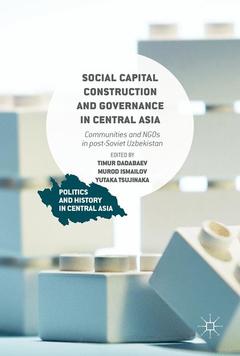Description
Social Capital Construction and Governance in Central Asia, 1st ed. 2017
Communities and NGOs in post-Soviet Uzbekistan
Politics and History in Central Asia Series
Language: English
Subjects for Social Capital Construction and Governance in Central Asia:
Support: Print on demand
Description
/li>Contents
/li>Biography
/li>Comment
/li>
Timur Dadabaev is an Associate Professor of International Relations at the University of Tsukuba, Japan and Director of Combined MA and Ph.D. Program in Central Eurasian Studies.
Murod Ismailov is an Assistant Professor of International Relations at the University of Tsukuba, Japan.
Yutaka Tsujinaka is Professor of Political Science at the University of Tsukuba, Japan.
Offers an alternative take on prevailing western interpretations of post soviet political and civil transitions, taking into account the role social capital and civil society




